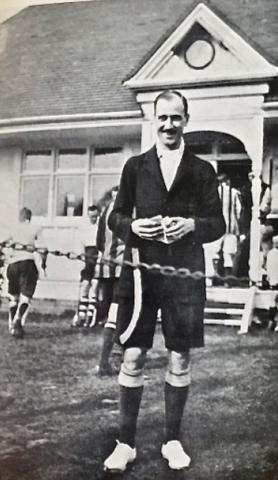IMAGE INFORMATION
EditStanley Howard Shoveller - Born September 2 1881 at 1 Park Road Villas, Park Road, Kingston upon Thames, Surrey, England – Died February 24 1959 in Broadstone, Dorset, England was a field Hockey Centre Forward, Vice President and Author.
Shoveller was educated at Queen Elizabeth's School in Kingston, learning to play Hockey there, later joining Kingston Grammar school and was one of the pioneers of Hockey at the school in 1897-98. He joined Hampstead Hockey Club at 18, being captain to 1909. In 1899 he represented Middlesex in 1899, and was selected for Surrey a year later.
Shoveller first played for England against Wales at Kersal in March 1902, at the age of 21, which was very young in those days. He marked his international début with the prettiest goal of the afternoon according to the Manchester Guardian on 10 March 1902, dribbling single-handed from the half-way line before finishing.
In the following 19 years he played 35 (37) times for England, being team captain for 10 years, representing Great Britain in international play. He won a gold medal with the England team at the 1908 Summer Olympics in London (7 goals). Twelve years later, when Antwerp, Belgium hosted the 1920 Summer Olympics, he once again won the gold medal with the Great Britain and Ireland squad, at age 39, being the top scorer with 12 of GB’s 17 goals, including eight in the final 12-1 win over Belgium.
His official England record shows that he scored 79 goals in 35 appearances, including 17 hat tricks, an average of more than 2 goals per match.
Shoveller captained the England team that played in an International Tournament organized by the German Olympic Council at Hamburg in October 1912 as a substitute for there being no Hockey at the Stockholm Olympics. At this event he scored four times in an 8–3 victory over Germany, and three times in a 10–0 defeat of Austria. These goals are not on his official record.
He was a most deceptive player to watch. He did not appear to be fast or to have remarkable stickwork or a devastating shot. But he was desperately quick off the mark, had wonderful control of the ball, without any flashy display of stickwork, took the ball away from and past a tackler with a body swerve and no obstruction and shot hard and accurately when necessary. His favourite and most effective method was, however, to bring the ball up to the left side of the goal and to score with a flick shot that no goalkeeper seemed able to stop.
Shoveller - or Shove as he was widely known in the game because others were uncertain how properly to pronounce his surname - dominated Hockey over two decades.
He was known as "the Prince of centre forwards" and "the immortal centre" for his prolific goal scoring.
On the outbreak of the First World War, Shoveller joined the Rifle Brigade, was commissioned second lieutenant, and went to France in 1915 with the 7th battalion. Wounded at Hooge, Belgium, in July 1915, he returned to the front, was awarded the Military Cross later in 1915, and promoted to lieutenant in December 1915. He was promoted to captain in 1917 and served through the remainder of the war, relinquishing his commission in July 1919.
He was a vice-president of the Hockey Association from 1921 until his death, and was an England selector in the 1930s.
In retirement, Shoveller wrote extensively on the sport and its techniques, compiling with Marjorie Pollard, a leading exponent of the women's game, a handbook, Hockey (1936). In that and other works he set out his ideas on forward play and the importance of the centre-forward in linking the forward line, feeding short passes to the insideforwards, or opening up defences by unexpected long diagonal forward passes to the
wings.



































